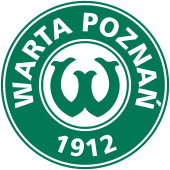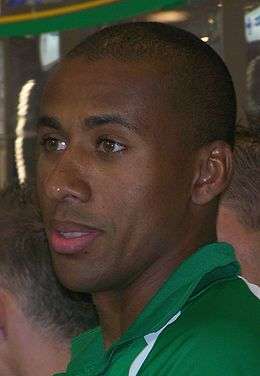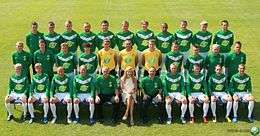Warta Poznań
Warta Poznań (Polish pronunciation: [ˈvarta ˈpɔznaj̃]) is a multi-sports club based in Poznań, Poland.
 | |||
| Full name | Klub Sportowy Warta Poznań | ||
|---|---|---|---|
| Nickname(s) | Zieloni (The Greens) | ||
| Founded | 15 June 1912 [1] | ||
| Ground | Stadion przy Drodze Dębińskiej, Poznań, Poland | ||
| Capacity | 4,694[2] | ||
| Chairman | Michał Wieczorek | ||
| Manager | Piotr Tworek | ||
| League | Ekstraklasa | ||
| 2019–20 | 3rd (I liga), promoted | ||
| Website | Club website | ||
|
| |||

Founded in 1912, the association football club are two-time winners of the Polish Football Championship, in 1929 and 1947, and have returned to the Polish Ekstraklasa after being absent for 25 years. Warta successfully won the playoffs for promotion in the 2019–20 I liga. The name means the Guard in Polish and also a name of river Warta on which Poznań is located. The club also played in second level between 1951–1952 (2 seasons), 1956–1960 (5 seasons), 1970–1971, 1973–1975, 1977–1979, 1991–1993, 1995–1996, 1997–1998 and since 2007. They played in the top level last between 1993–1995.
The club has also one of the most successful field hockey and tennis teams in the country.
History
Beginnings

On June 15, 1912, the Warta Poznań Sports Club(Klub Sportowy Warta Poznań) was established, which later became known as "the first lady of Wielkopolska". Its founders were young Poles who previously played in the German clubs in Poznań: Marian Bey, Stefan Malinowski, Stefan Mórkowski, brothers Edmund and Franciszek Szyc and Ludwik Zysnarski. They were included in the first board of the club, whose first president - as the oldest member of the board - became Franciszek Szyc. His brother Edmund was appointed secretary, and Marian Bey was the team captain. At the founding meeting, white and green were chosen as statutory colors.
As part of the difficulties introduced by the partitioning authorities, matches involving Polish teams were forbidden. This prohibition accelerated the decision to organize the first Wielkopolska championship in 1913, in which three teams participated: Warta Poznań, Posnania and Ostrovia Ostrów Wielkopolski. The results were as follows: Posnania - Warta 1–1, Warta - Ostrovia 3–2, Ostrovia - Warta 3–4, Warta - Posnania 2–2.[3]
The first champion of Wielkopolska league was Warta Poznań. The inaugural championship of the region resulted in an surge of football popularity in Poznań. New football leagues, including only Polish youth, began to emerge at a rapid pace. Such teams were: Trytonia[3] founded in Łazarz and a team called Sparta established in Jeżyce. In 1914, despite the start of hostilities related to the outbreak of World War I, efforts were made in Poznań to organize sports life as much as possible, which was not easy at all due to the martial law imposed by the Germans. In general, the regulations did not allow any kind of meeting or assembly to be held without proper permits. Despite these difficulties, in 1914 the second Wielkopolska Championships were held, in which only two teams participated: Warta Poznań and KS Posnania. The results of this two-legged match were as follows: in the first one, Warta quite smoothly defeated Posnania 6–3[4], and in the second competition the same outcome happened, beating there opponent 2–1.[5]
In 1915, Warta played matches with the Fever Kościan club, in which the white and greens turned out to be worse than the guests; first losing to them 3–1, then drawing 5–5.[5] One of the mysteries of 1915 is finding reliable information about who won the next championships of Wielkopolska. From the chronicle of the Ostrovia club, you can learn that it was them that won the championship. However, many researchers doubt that this is true, as there are no other source materials on the basis of which this record could be confirmed. Another theory is possible, provided by J. Owsiański and T. Siwiński. Namely, that Ostrovia assigned the championship title to itself after winning the match against Warta Poznań. It would be a logical explanation of the record in the chronicle about winning the Wielkopolska championship. In this aggregate match, the first match ended with Warta's victory 4–2, the second match ended with the victory of the team from Ostrów 4–1. The year 1915 was not only about matches between Polish teams, but also matches with German teams. It is worth mentioning here about the match that was played in December between Warta Poznań and probably the strongest German team DeutscherSportverein (DSV). The match itself ended with a score of 2–2, which can be considered a great success for the Polish team, and also a very good sports forecast for the coming years. The matches between the Poznań teams took place in the following years of World War I. In 1916, there were surprises at the very beginning, when Warta's team first succumbed to Unia 1–2, then unexpectedly drew 2–2 with Stella Gniezno.[6] In the same year, another match between the DSV team and Warta took place, where the team from Poznań turned out to outclass the German club, beating the German opponent by 4–0. The year 1917 is, in turn, a jubilee year for the club, which celebrated its 5th birthday. The great celebrations that took place during the 5th anniversary of the team can be found in the club's chronicle. For this reason, a tournament was organized with the participation of the best teams from Poznań. This year is not only the celebration of the 5th anniversary of the team. There was also a change in the head of the club - Franciszek Rotnicki now stood at the helm of the team, about whom it was written at the time: “… A man of great authority, energetic and enterprising. It is he, together with a skillfully selected group of associates, who builds solid foundations for the future size of the club in this difficult period. Anticipating the inevitable end of the invasive Prussian imperialism, he focuses the efforts of the management primarily on consolidating the club tradition, on sticking to the colors of the Warta ... ”[7]. For Warta, 1917 is not only a time of celebration, but also more matches between the teams from Poznań. On top of all this, there was cooperation with the Polish Military Organization. The last year of the war brought more sports skirmishes between the teams from Wielkopolska. However, the most important news was the information about the end of World War I and about the peace arrangements, which spoke about the restoration of a free and independent Poland.
Interwar period
1918 was not only a great joy for the country of Poland to regain independence after 123 years, but also new opportunities for Polish sport, organized within the territory of the Polish state, without the interference of powers as to the shape and manner of development of sports societies or clubs. Organization and reconstruction took place on the ruins that remained after the hostilities. During the conflict, many good athletes died, as well as many distinguished activists, the already modest sports base was essentially destroyed. Another fight awaited Wielkopolska, a national uprising which was the Greater Poland Uprising, which was successful and resulted in the expulsion of the German partitioning authorities. During this national uprising, every footballer who was then staying in Poznań, regardless of the consequences that could meet him, volunteered for military service in order to be able to fight for his homeland. With the arrival of 1919, it was decided to reactivate the sports structures that was trying to be formed before the outbreak of World War I, and it was also decided to play the first post-war Wielkopolska championship. 5 teams, including 4 from Poznań, entered the competition. These clubs were: Unia, Warta, Posnania, and Pogoń.[8] However, the fifth team that entered the championship was the team from Ostrów Wielkopolski, which was Ostrovia. The results of these championships were as follows: Posnania - Ostrovia 3–1, Ostrovia - Warta 1–7, Unia - Pogoń 9–1, Warta - Posnania 7–0, Ostrovia - Pogoń 3–2, Unia - Warta 2–3, Pogoń - Posnania 3–3, Unia - Ostrovia 4–0, Warta - Pogoń 7–0, Unia - Warta 4–1.[9]
The matches of the Wielkopolska championship were not the only matches that took place in Poznań. There were also friendly matches with the participation of Warsaw teams. And so, among others, the capital of Wielkopolska was visited by clubs such as the Polonia and Korona, which played matches with Poznań Warta.[8] In 1921, the Klasa A district championship began, with football clubs from Wielkopolska such as Warta,[9] Pogoń, and Stella Gniezno.[10] The team of Warta Poznań turned out to be the victor team again.
Honours
- Ekstraklasa (First Division):
- 1st place (2): 1929, 1947
- 2nd place (5): 1922, 1925, 1928, 1938, 1946
- 3rd place (7): 1921, 1923, 1926, 1927, 1932, 1935, 1936
- Youth Teams:
- Polish U-19 Runner Up: 1936, 1975
Current squad

- As of 1 August 2020[11]
Note: Flags indicate national team as defined under FIFA eligibility rules. Players may hold more than one non-FIFA nationality.
|
|
Players out on loan
Note: Flags indicate national team as defined under FIFA eligibility rules. Players may hold more than one non-FIFA nationality.
|
Managers
- As of 2 August 2020.
|
|
|
See also
References
- http://kswarta.pl/index.php?sid=6&pid=25
- http://stadiony.net/stadiony/pol/stadion_warty_ogrodek
- Owsiański, Jarosław; Siwiński, Tomasz (2013). Historia futbolu Wielkopolskiego (in Polish). p. 36. ISBN 978-83-64237-00-3.
- Owsiański, Jarosław; Siwiński, Tomasz (2013). Historia futbolu Wielkopolskiego (in Polish). p. 39. ISBN 978-83-64237-00-3.
- Owsiański, Jarosław; Siwiński, Tomasz (2013). Historia futbolu Wielkopolskiego (in Polish). p. 43. ISBN 978-83-64237-00-3.
- Owsiański, Jarosław; Siwiński, Tomasz (2013). Historia futbolu Wielkopolskiego (in Polish). p. 46. ISBN 978-83-64237-00-3.
- 25 lat Warty : 1912-1937 : jubileuszowa księga pamiątkowa (in Polish). Poznań: Poznań : Klub Sportowy "Warta", 1937 ([Poznań] : Druk. "Dziennika Poznańskiego"). 1937. p. 3.
- Woltmann, Bernard (2001). Piłka nożna w Wielkopolsce 1921-2001 [Football in Greater Poland 1921-2001] (in Polish). Poznań. p. 13. ISBN 83-906638-4-8.
- Owsiański, Jarosław; Siwiński, Tomasz (2013). Historia futbolu Wielkopolskiego (in Polish). p. 55. ISBN 978-83-64237-00-3.
- Owsiański, Jarosław; Siwiński, Tomasz (2013). Historia futbolu Wielkopolskiego (in Polish). p. 60. ISBN 978-83-64237-00-3.
- "Kadra pierwszego zespołu 2019/20". Warta Poznań. Retrieved 1 August 2020.
External links
| Wikimedia Commons has media related to Warta Poznań. |
- Warta Poznań Official Website
- Warta Poznań (90minut.pl)